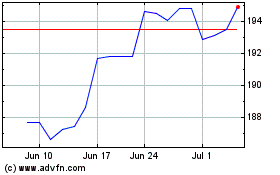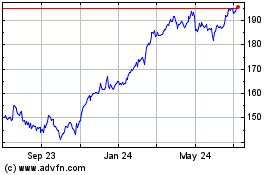Businesses Say Tax Proposal Goes Too Far
July 06 2016 - 2:30PM
Dow Jones News
The federal government says U.S. corporations will spend a
combined $13 million annually complying with proposed tax rules on
internal corporate debt. But an industry trade group estimates that
could be the cost for just one company.
That divide over compliance costs is one flashpoint in a
widening regulatory dispute between companies and the Obama
administration, and the tensions could rise in coming months as the
government tries to complete rules the Treasury Department says are
intended to curb tax avoidance.
Corporations and business groups, increasingly worried about the
scope of the proposed Treasury rules, say U.S. officials
underestimate the difficulty of creating systems to track and
document internal loans and fail to understand how the rules
disrupt common business structures that aren't about dodging
taxes.
The proposed rules are just one part of the Obama
administration's multipronged attack on tax-driven deals, including
corporate inversions, that companies registered outside the U.S.
have used to reduce payments to the U.S. Treasury.
Comments are now pouring into the government ahead of a July 7
deadline. Companies such as Nielsen Holdings PLC, S&P Global
Inc. and Republic Services Inc. have proposed changes or raised
concerns, such as how the rules would treat partnerships and their
effect on the ability to claim foreign tax credits.
"In the last decade, this is one of the biggest business tax
issues that we have worked on," said Dorothy Coleman, vice
president of tax and domestic economic policy at the National
Association of Manufacturers, a business group that says it might
cost one member $13 million to comply. "It took us by surprise and
the business community by surprise."
Republican lawmakers have complained about the breadth of the
rules and asked for more time for companies to respond to the
proposals. Democrats have warned about adverse effects on the
financial-services, insurance and utilities industries. Top
Treasury officials will meet with lawmakers on Wednesday.
But the Treasury Department is sticking to its plans to hold a
July 14 hearing and finish the rules swiftly.
The goal is to reduce tax benefits companies can get with a
foreign legal address. Companies that adopt a foreign residency can
exploit the gap between the 35% U.S. corporate tax rate and lower
rates abroad by loading U.S. subsidiaries with debt in ways their
U.S.-based peers can't. They can deduct interest on that debt in
the U.S., effectively pushing profits to lower-taxed
jurisdictions.
The regulations under Section 385 of the tax code are aimed at
such "earnings stripping" transactions. Under the proposal, the
simplest forms of earnings stripping with debt would be considered
nondeductible equity investments. The IRS would also link payments
to the parent company with intercompany loans made three years
before or after such payments. That would prevent companies from
exploiting a loophole by doing in multiple steps what they now do
in one.
Critics say the effort might upend common corporate-finance
structures for U.S.-based and foreign companies. Because the
government wrote the regulations expansively, to prevent companies
from pursuing obvious workarounds, the effort would ensnare
ordinary transactions, they say.
Trade groups say the government's $13 million compliance-cost
estimate isn't even close to correct.
The government's estimate assumes compliance requires 735,000
hours of work annually for all companies, making the per-hour cost
less than $18. Given that companies will deploy lawyers and
accountants to document and analyze internal loans, that figure is
"absurdly small," according to the trade group U.S. Council for
International Business, which filed comments contending total costs
could reach billions of dollars.
"The consequences of failing to provide documentation are
punitive; therefore, companies need to be certain they have
satisfied all of the documentation requirements," wrote William
Sample, a tax executive at Microsoft Corp. and chairman of the
council's taxation committee.
"We appreciate feedback from industry sharing their views on
expected impacts," a Treasury spokesperson said. "We continue to
encourage thoughtful comments that suggest solutions to any
concerns as we move to finalize the regulations."
Steve Rosenthal, a senior fellow at the Tax Policy Center who
supports the rules, said the $13 million compliance-cost estimate
is low. But he noted that the revenue loss to the government from
earnings stripping is much bigger. Treasury estimates the
government would collect an additional $843 million a year.
Companies also are concerned the rules could affect
cash-management operations, which often involve regional treasury
centers that accumulate cash and distribute it to subsidiaries in
what are effectively short-term loans. Treasury officials have said
they are open to resolving this issue.
"If it were a targeted rule, the companies wouldn't be going
nuts the way they are," said Carol Doran Klein, USCIB's vice
president and international tax counsel. "It hits virtually
everything they do."
Write to Richard Rubin at richard.rubin@wsj.com
(END) Dow Jones Newswires
July 06, 2016 14:15 ET (18:15 GMT)
Copyright (c) 2016 Dow Jones & Company, Inc.
Republic Services (NYSE:RSG)
Historical Stock Chart
From Mar 2024 to Apr 2024

Republic Services (NYSE:RSG)
Historical Stock Chart
From Apr 2023 to Apr 2024
